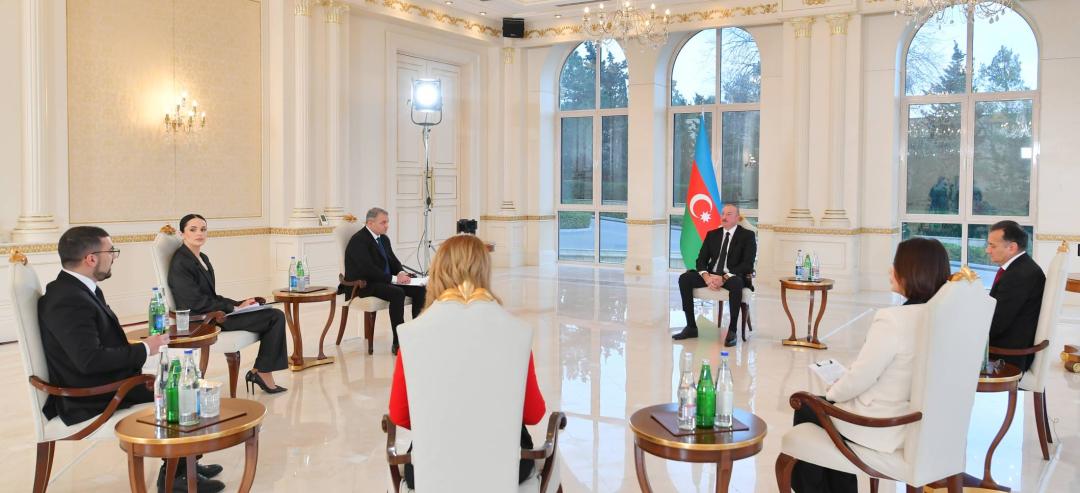
Ilham Aliyev Discusses Foreign Policy, Karabakh, and Controversies with France

On January 10, Ilham Aliyev, the President of the Republic of Azerbaijan, was interviewed by local TV channels.
Talking about Azerbaijan's future foreign policy goals, Aliyev noted, "Today's Azerbaijan is among the strongest countries in the world in the truest sense of the word. The new tasks facing the country today are the tasks of the new era. We resolved the key task, as you mentioned, a few months ago by fully restoring the sovereignty of our country, and the events of September, of course, should not be taken out of the overall context."
Regarding the Karabakh issue and the relations with Armenia, he emphasized: "Of course, we were not going to impose any sanctions on innocent soldiers. However, our position regarding the separatists' leaders was unequivocal – their capture. Some tried to escape from there through the Lachin road, others were found in Khankendi, and others were still captured in other places. We knew their whereabouts." "Cargoes, citizens going from Azerbaijan to Azerbaijan should pass there freely without undergoing any inspection. Otherwise, Armenia will remain in an eternal deadlock, and if the route [Zangezur corridor] I mentioned is not opened, we will not open our border with Armenia anywhere else. So they will do themselves more harm than good," the head of state pointed out. "Fundamental conditions for signing a peace treaty have now been created. Armenia is seeking guarantors for the peace treaty. We believe that there is no need for that. This is a peace treaty to be signed between two sovereign states. We don't need any guarantors here, and if it is going to be signed in a bilateral format, it should be signed. If someone wants to help, we don't mind that either. However, this help should not be mandatory," the head of state pointed out. "The issue of the eight villages under occupation is always on the agenda today. This issue was discussed during my contacts with the prime minister of Armenia, including the last conversation on foot in St. Petersburg. I raised this issue, and this issue is also on the agenda of commissions dealing with delimitation. I should also inform you that the next meeting of the commissions is scheduled for this month, and this issue is on the agenda: the delimitation issue of that region, the Gazakh-Tovuz region," President Aliyev noted.
Touching upon the controversies with France, the Azerbaijani leader stressed, "We will persist on our journey. We are completing our chairmanship of the Non-Aligned Movement, but the Baku Initiative Group will live on. We will contribute to exposing French neocolonialism and to the process of freeing French colonies from the French colonial yoke," the head of state pointed out. In addressing the desecration of Khurshidbanu Natavan's statue in France, the President drew a parallel with the Armenians' act of digging Natavan's grave in Aghdam, emphasizing the striking similarity between the two incidents." Highlighting the colonial policy of France in an interview with local television channels, the President of the Republic of Azerbaijan provided insights into the detention of an Azerbaijani female journalist in New Caledonia last month. The head of state noted: "An Azerbaijani journalist was recently detained in New Caledonia. How can that even be possible? On suspicion of almost spying. She had gone there to cover events." "The negative attitude towards us, the negative attitude from traditional sources, will not abate. The aim of arming Armenia is aimed exactly at that, at keeping us under constant pressure. These are efforts to prevent us from living comfortably, and, unfortunately, France is still at the forefront. France is the country that arms Armenia, gives them support, trains their soldiers, and prepares them for another war. When I said that France's policy is causing tensions in the Caucasus, this is exactly what I meant," the President underlined.
Moreover, President Ilham Aliyev explained the key reasons behind the conditions for the snap presidential election scheduled for February. He noted that, first, this is associated with the beginning of a new era following the events in September. He emphasized that the second reason is the crucial nature of holding the presidential election as the inaugural election in every part of the territories throughout the independent history. "Another reason is that my activities as President have passed the 20-year mark. This is also a certain period, and we must treat this as a conclusion in itself. The holding of a presidential election again after 20 years, of course, represents a justification for this chronological period," the head of state added.
See Also


Mirzoyan Meets US Deputy Assistant Secretary Joshua Huck

Azerbaijani President Holds Talks with UAE and German Business Delegations on Economic Cooperation

Grigoryan Confirms Armenia’s Readiness to Dissolve OSCE Minsk Group Upon Peace Treaty Signing

Azerbaijani Official Warns of Ecological Risks to Caspian Sea, Similar to Lake Urmia and Aral Sea

